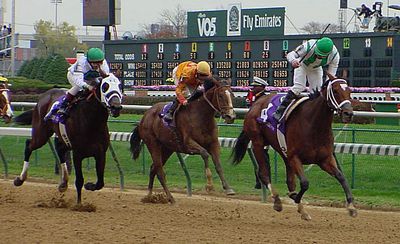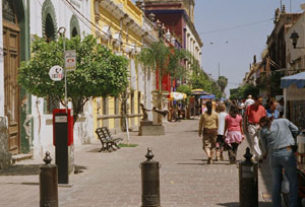Westwords
Victor Espinoza – Mexico’s Triple Crown Jockey
One more win can make a wonderful world of difference.

Victor Espinoza, 43, calls himself the luckiest Mexican alive. He was the jockey aboard American Pharoah, winner of the U.S. triple crown of horse racing – the Kentucky Derby, Preakness and Belmont Stakes.
His name will be forever etched in sporting history. Fame and fortune are likely partners for the rest of his life. Only 11 riders have accomplished this rare feat. The last time it happened was 1978.
In addition to being good at what he does, Espinoza is a bonus for racing. He has personality. He is articulate. He is generous. He gives 10 per cent of his earnings to the City of Hope, a California research and treatment charity for children with cancer.
He donated all his pay from the latest New York race, $50,000 or more. He is gaining in other ways. He appeared on several TV shows. He threw out the ceremonial first pitch at a Yankee baseball game. He has or will sign endorsement deals.
Espinoza was born May 23, 1972 at Tulancingo, Hidalgo, the 11th of 12 children. He uses the term “modest circumstances.” He says he grew up on a goat farm, that he and whichever brothers were available herded hundreds up a mountain each morning and back down each evening. Counting goats gave him a head start in math.
Horses? There were two on the farm.
“I was very afraid of the horses. I was a small guy.”
He had not heard of horse races but an older brother, Jose, whetted his interest. The idea had merit. Victor was the right size to ride. To be paid, he had to attend jockey school for certification. He had no money. He lied about his age, got a driver’s license and a job with the Mexico City transit system.
“I had to get my brother’s ID to look older.”
Maybe you saw him driving a bus at age 15 or 16, in daily conflict between sitting low enough to reach the accelerator and brake and high enough to see over the dash. If you are reading this, it probably means you ducked and ran when he came speeding through traffic lights and whizzing around corners.
It has been said by a weak-kneed gringo that Mexico City traffic is a seemingly infinite maze of daredevils and incompetents, of axle-bending potholes and curb-hugging taco stands, of seven-way intersections without signs and goofy circles where you drive around and around. Add in the window washers, sword-swallowers, tamale vendors on tricycles and police with their hands out and you get the picture.
After that maturing experience, Espinoza found riding thoroughbreds through crowded turns on dirt tracks more like a stroll in the park. In nearly every race, the horses were going the same direction.
Espinoza was not an instant success but he achieved some long before the Triple Crown. He first won at the Hipodromo de las Americas in Mexico City. He migrated. He was told jockeys could be millionaires. He wanted to be one.
In 1994 he was the leading apprentice at Bay Meadows and Golden Gate Fields. A year later, he moved to Los Angeles. He won a big one, the Breeders’ Cup Distaff, in 2000 aboard the horse Spain.
His record and reputation grew. He slumped and bounced back. He has won more than 3200 races and earned purses in excess of $173 million.
His mother, Gloria, now 85, finally got interested enough to start watching on TV. He’d call home to talk about what she had seen. She would ask if he was eating well. He’d say no, he couldn’t, he had to just nibble and taste to keep his weight down. He is 5-1½ feet tall and 112 pounds light.
“She worries about my health. She is very religious.”
Victor had two previous flings at racing immortality. He was up on War Emblem for Derby and Preakness wins in 2002 but didn’t come close in the Belmont. Last year, Espinoza and California Chrome won two-thirds of the crown, thus becoming the 23rd to almost make it but finish with disappointment.
The third time was the charm, completed with minimum duress.
Over and over Victor has said “I am the luckiest Mexican alive.”
There is another Mexican jockey who approached the Triple Crown, didn’t get it and has returned to the obscurity from whence he came.
Mario Gutierrez Jr. grew up on a little farm in Veracruz. The family had almost nothing.Mario Gutierrez Sr. raised and trained quarter horses.
“I always wanted to be like my dad. I asked him to teach me how.”
Gutierrez followed a similar path to Victor Espinoza’s, minus the bus driving, and learned at the Hipodromo in Mexico City. A Canadian trainer on vacation spotted Mario, recognized promise and, through an interpreter, invited him to go north, young man, go north.
Gutierrez had just two lifetime wins and couldn’t speak a word of English. The trainer, Terry Jordan, escorted the youngster to the Canadian embassy and helped him get papers to make the move.
In 2006, Gutierrez won 91 races as an apprentice in Canada. He dropped down to California. Another trainer saw him ride well and offered steady work at Hastings Racecourse in Vancouver, British Columbia.
On the first Saturday in May 2011, Mario Gutierrez was far, far away from the Kentucky Derby, watching on TV from the jockeys’ room at Hastings. Of course he dreamed but didn’t really think he would ever have the chance.
The same stroke of luck that got Gutierrez to Canada got him to Louisville, Ky. An owner and trainer, discussing the need for a different jockey for I’ll Have Another, happened to see Mario ride a winner in a minor race.
He looked good in the irons. He had good balance. He had patience. They asked him to ride their horse in practice. They recognized a match.
On the first Saturday in May 2012, the unheralded Gutierrez, 25, not only rode in the Kentucky Derby before a record crowd of 165,307, he stole the show. He and I’ll Have Another, a 15-1 shot, won the 138th running of the famous race. There were tears in his eyes.
Jockey and the three-year-old went to the Preakness. They were a length behind late in the race but made it to the finish line a nose ahead.
Two-thirds of the Triple Crown is a major accomplishment. They moved on to the Belmont, a mile and a half from racing history.
You may not believe this part: The day before the chance of a lifetime, I’ll Have Another was stunningly scratched due to tendinitis and then abruptly retired from racing.
The racing industry tried to make the best of a very bad situation. Officials brought the horse and jockey to the winner’s circle for ceremonial photographs. Gutierrez failed to fight back the tears.
“One day you have everything,” he said, “and the next day it’s gone.”
And gone he has stayed.
He did not ride in a Triple Crown race this year. Through no fault of his own, he has had fewer opportunities. He has dropped off the chart in seasonal earnings.
Mario Gutierrez in not the luckiest Mexican alive.


